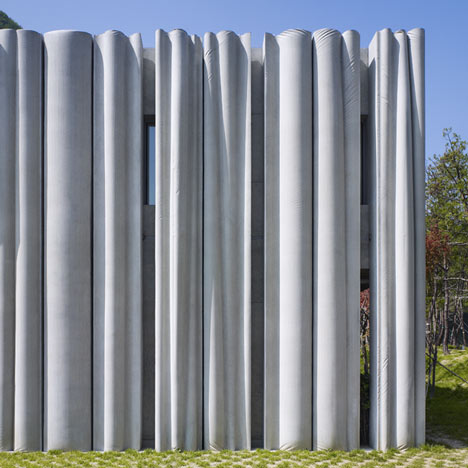This wavy wall forms the east facade of an information centre designed by BCHO Architects at a Korean concrete factory.
Called Hanil Visitors Center and Guest House, the information centre aims to educate visitors about recycling concrete and demonstrates different options through its own construction.
Four openings in the eastern wall allow glimpses of how the concrete is produced in the factory, and to the garden at the centre of the building.
More about BCHO Architects on Dezeen: Earth House (June 2010)
Photographs are by Yong Gwan Kim.
Here's some more information from BCHO:
Hanil Cement Information Center and Guesthouse
The Purpose of this project is to educate visitors about the potential for recycling concrete. In Korea concrete is the primary building material so it is imperative that we begin to re-use, the otherwise waste, concrete as buildings come down and are replaced.
The Information Center is an example of how to re use this material in different types of construction, casting formwork types as well as re-casting techniques. Concrete has been broken and recast in various materials creating both translucent and opaque tiles. The displays will continue to evolve and change at the Information Center as new techniques are developed. The gabion wall and fabric formed concrete which constitute the main facdes of the building, was erected first, and the concrete left over from it was recycled in the gabion cages, on the rooftop for insulation from sun, and as a landscape material at the street and around the factory.
The site is located to the westernmost part of the factory, adjacent to Mt. Sobaek National Park. The existing land had been changed much to facilitate the movement of trucks to the cement factory. First of all, we tried to restore the damaged original mountains and forest. In order to revive the landscape, we brought in earth to fill the courtyard between the two buildings. The flow of the mountains from the west leads to the reception and cafeteria in the inner courtyard of the building. In the in-between spaces we allowed people to experience the mass of the building while watching the building shift around its central courtyard.
While following the linear placement and movement of land and earth, we came up with ideas for the new building facde. We applied canvas-like concrete walls to the east facde, evoking images of the adjacent forest.
There are four openings in the eastern wall and long vertical windows have been created in their in-between spaces. Through the windows, one can see how concrete is produced at the factory. Behind the two larger openings, one can see the courtyard of the Visitors Center and the cafeteria next to the courtyard, which is encircled by a water garden.
Hanil Visitors Center and Guest House
Architect: Byoungsoo Cho
Project Team: Nicholas Locke, Youngjin Kang, Taehyun Nam, Greg Hale, Seunghyun Kim
Location : 77, Pyeongdong-ri, Maepo-eup, Danyang-gu, Chungbuk, Korea
Site area : 3,957㎡
Gross floor area : 648.9㎡
Total floor area : 1031.2㎡
Building-to-land ratio : 16.4%
Floor area ratio : 26.06%
Building scope : 2F, B1
Structure : RC
Exterior finishing : Fabric formed concrete, Recycled concrete
Consultants: Mark West, C.A.S.T. University of Manitoba (fabric form concrete)
Design period : 2007.10.~2008.09
Construction period : 2008.05~2009.04
Photographs: Yong Gwan Kim
See also:
.
| Pestalozzi School by SOMAA |
Concrete Cloth by Concrete Canvas |
More architecture stories |

